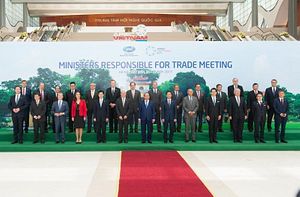The now-defunct Trans-Pacific Partnership (TPP) was a chance for Australia to ensure that it became entrenched within the regional alliance framework in the Asia-Pacific and continue to economically integrate with its regional counterparts. It’s therefore Canberra’s geopolitical imperative to ensure it plays a leading part in the discussions involving the structure and peculiarities of the ASEAN-led Regional Comprehensive Economic Partnership (RCEP) – cementing itself as a bastion for the deal’s governance, environmental standards and intellectual property measures that have plagued the RCEP to date. Australia must use its experience and influence in these areas to ensure it’s a valued partner in the discussions, establishing itself as a credible and leading power in the Asia-Pacific in the wake of the United States’ growing absence.
The RCEP is a proposal for a regional free trade area, initially involving the ten ASEAN member states and the countries that have existing Free Trade Agreements (FTA) with ASEAN – Australia, China, India, Japan, South Korea and New Zealand. The RCEP has the potential to deliver a comprehensive and high-quality mutually beneficial economic agreement that allows member nations to partner on a wide range of issues, including, but not limited to; trade and investment in goods and services, economic and heuristic cooperation, intellectual property and competition measures, and dispute and resolution mechanisms.
The opportunities are immense – the 16 participating countries in the RCEP account for almost 50 percent of the world’s population, over 30 percent of global GDP, and over 25 percent of world exports, with said economies accounting for almost 60 percent of Australia’s two-way trade, 18 percent of her two-way investment, and over 65 percent of her exports. The RCEP will be conducive to lowering trade barriers with said countries and securing improved market access for Australian exporters and investors.
However, the RCEP negotiations are challenged by competing interests and conflicting priorities that are born out of varying degrees of economic and political development between member states. The TPP included a host of accords vis-à-vis governance for state owned enterprises, intellectual property transparency, environmental standards, dispute resolution and data liberalization. The RCEP lacks such provisions – it does not require members to protect labor rights or improve environmental standards as the TPP did, and transparency and governance around the deal have been flagged as a potential concern.
Australia must seek to balance its international trade objectives with its desire to play a role as a key negotiator for the deal’s core concerns and wider governance. It’s economically beneficial for Australia to ensure that the deal grants Australia wider economic and investment freedom. Advocating for increased legislative and regulatory transparency in key RCEP markets, easing finicky FDI restrictions in certain sectors or corporations, and allowing Australian investors to set up branches in partner countries without entering into a joint venture with a local partner will increase Australia’s outgoing and incoming investment and help Australian investors garner more control over their investments in RCEP partner countries. It’s also imperative that Australia balances Investor State Dispute Settlement (ISDS) clauses to simultaneously encourage investment, judicial and regulatory transparency, and to prevent Australia from being prosecuted by foreign companies. Managing multi-nation tension points should be a priority for the Australian government as a way to cement herself in discussions.
An example of such a contention point is tariff reduction in India. India’s willingness to adopt a single-tier tariff reduction approach has been pegged to their demand for greater market access into core RCEP partners. A single-tier tariff reduction would be advantageous for Australian food, wine and dairy sectors, particularly the latter given recent decline in milk prices and reduced demand from importers of Australian milk. A multi-tiered approach would see Australia on a much lower tier and make it significantly costlier to access India’s core markets.
However, other RCEP countries are reluctant to further open access for Indian service providers, and India themselves must balance their willingness to gain market access to other RCEP countries whilst acknowledging the threat China, South Korea, and Japan pose to their manufactured goods sector. Australia must ensure it advocates for a single-tier tariff reduction approach whilst trying to encourage other RCEP partners to, at least partially, liberalize their economies to the Indian services market.
The differences in economic circumstance and priorities of many of the RCEP partners make negotiations tricky, which is why it’s especially important that Australia uses its diplomatic tact to manage the discussions and position herself as a key stakeholder in the negotiations. Australia’s approach to addressing any impediments should be to encourage a more open and transparent environment for Australian investors in key regional economies such as China, India and Indonesia, encourage nations to prioritize liberalization of two-way investment, and gain improved access for Australian investors in Australia’s key regional markets – manufacturing, mining, agriculture, fisheries and forestry.
Australia should also lend its hand as a bastion of the deal’s governance, continually touting for increased transparent communication and cooperation, defining dispute mechanisms and control frameworks, advocating for rigorous intellectual property and environmental protection measures, and promoting a deal that is a benefit to the wider collective instead of mired by petty grievances. In doing this, it will cement her place in the deal’s negotiations and ensure it’s part of the wider economic, social and political architecture of the Asia-Pacific for years to come – regardless of whether the United States truly abdicates from the region.
Nick Derewlany is a political economy and international relations graduate from the University of Sydney. He currently working for an online geopolitical risk consultancy, Wikistrat.

































